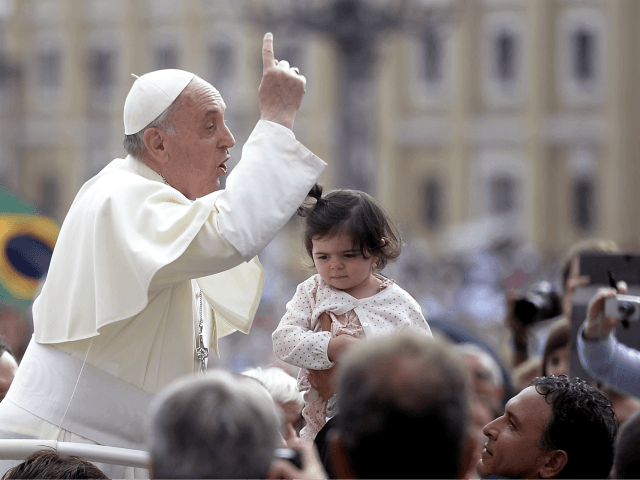Italian media have raised an alarm over attempts by the Vatican communications office to censor Pope Francis’ words in an apparent effort to make them more palatable to a global audience.
The latest casualty of the Vatican’s editorial clean-up crew was the pope’s address last weekend to students and teachers from the San Carlo Institute in Milan, in which the pontiff often went off-script to add spontaneous and occasionally colorful commentary.
A comparison between the official Vatican transcript of the address and the video of the actual event reveals not only ordinary grammatical tweaks to correct the pope’s Italian, but the expurgation of entire expressions or phrases deemed potentially problematic. It is unclear whether the censorship has taken place with the pope’s knowledge and approval or without it.
As Breitbart News reported Monday, one important discrepancy between the two texts came when the pope “named names” of those he blames for wars in Yemen, Syria, and Afghanistan. During the meeting, the pope exclaimed with voice rising in anger that these wars have taken place because “rich Europe and America sell weapons to kill children and kill people.”
Curiously, the pope’s explicit mention of Europe and the United States was lifted from the transcript of Saturday’s address, and the pope’s censors replaced his provocative words with a gentler substitute.
“But why do they wage such a cruel war? Because other countries sell them arms, with which they kill children and people,” the redacted text reads (emphasis added).
The attentive folks at caffestoria.it discovered the doctoring of another controversial expression during the same speech in reference to migrants and mafias.
“People say they are delinquents,” the pope told his audience. “But we have our own share of delinquents here as well. It was not the Nigerians who invented the mafia. It is a national ‘treasure,’ the mafia is ours, ‘made in Italy,’ it’s ours. And all of us have the possibility of becoming delinquents.”
The pontiff’s words, meant as a rebuttal to those who have underscored the growth of a dangerous Nigerian mafia in Italy, were completely removed from the official transcript of his address offered by the Vatican, as if the pope had never said them.
The Vatican communication’s department has already gotten into trouble for its text-tampering, but apparently not enough to learn the lesson.
In March 2018, a digitally manipulated photo of a letter by Pope Emeritus Benedict XVI gave rise to an international dust-up that came to be known as the “Lettergate” scandal, resulting in the forced resignation of Vatican communications director Msgr. Dario Edoardo Viganò.
Journalists accused the Vatican communications department of propagating “fake news,” and the Associated Press (AP) said the Vatican’s doctoring of the photograph “violated photojournalist industry standards.” The missing content “significantly altered the meaning of the quotes the Vatican chose to highlight,” AP said, because they “suggested that Benedict had read the volume, agreed with it and given it his full endorsement and assessment,” which he had not.
In a stunning irony, just weeks after he was let go, Msgr. Viganò delivered a talk on “fake news” at a high-profile conference in Rome.
Just two months ago, a similar scandal broke out, when journalists discovered that a Vatican spokesman, Father Thomas Rosica, had committed serial plagiarism over a period of some 25 years.
Father Rosica’s first known act of plagiarism was in an academic paper dating back to 1994, in which liberally copied and pasted from others’ works without attribution, but his intellectual piracy continued unabated up to the present day.
First Things editor Matthew Schmitz and others unearthed a seemingly interminable trail of plagiarized texts dating back years. Schmitz tweeted out passages of Rosica’s writings side by side with the original texts, highlighting the extensive blocks of directly copied material.
Rosica’s plagiarism “appears to be endless,” Schmitz tweeted. “I can’t recall seeing a more extreme case.”
In his 2018 message for World Communications Day, Pope Francis railed against disinformation and “fake news,” saying that he wished to contribute to “stemming the spread of fake news and to rediscovering the dignity of journalism and the personal responsibility of journalists to communicate the truth.”
Even prior to the release of his message, Francis had denounced the spread of fake news on several occasions, comparing it to excrement and condemning it as a “very grave sin.”
Follow Thomas D. Williams on Twitter Follow @tdwilliamsrome

COMMENTS
Please let us know if you're having issues with commenting.